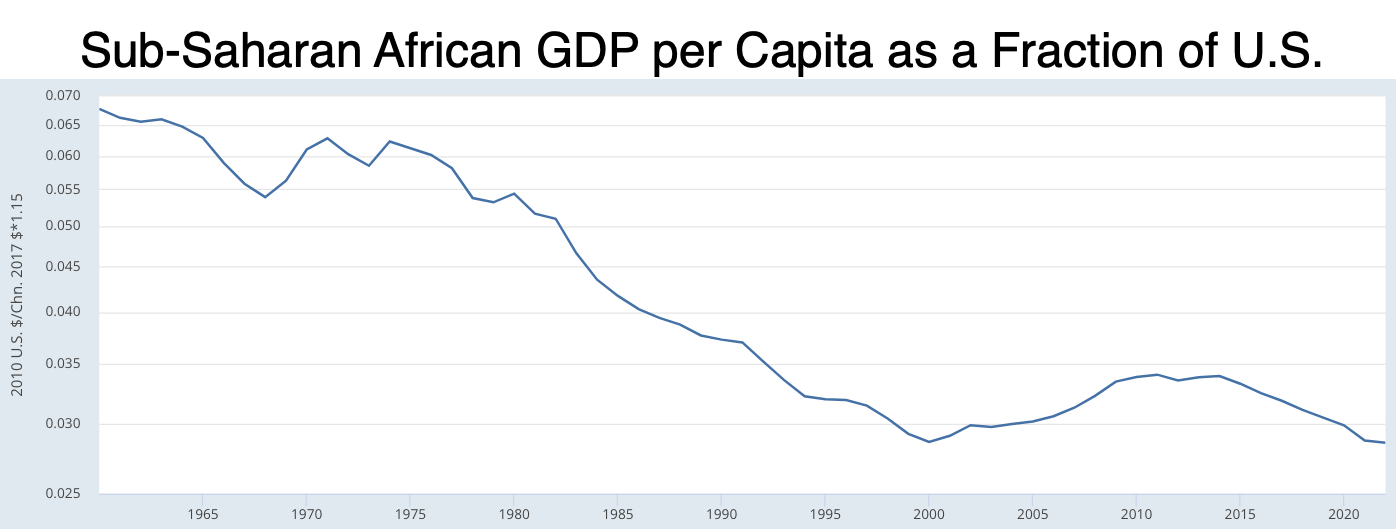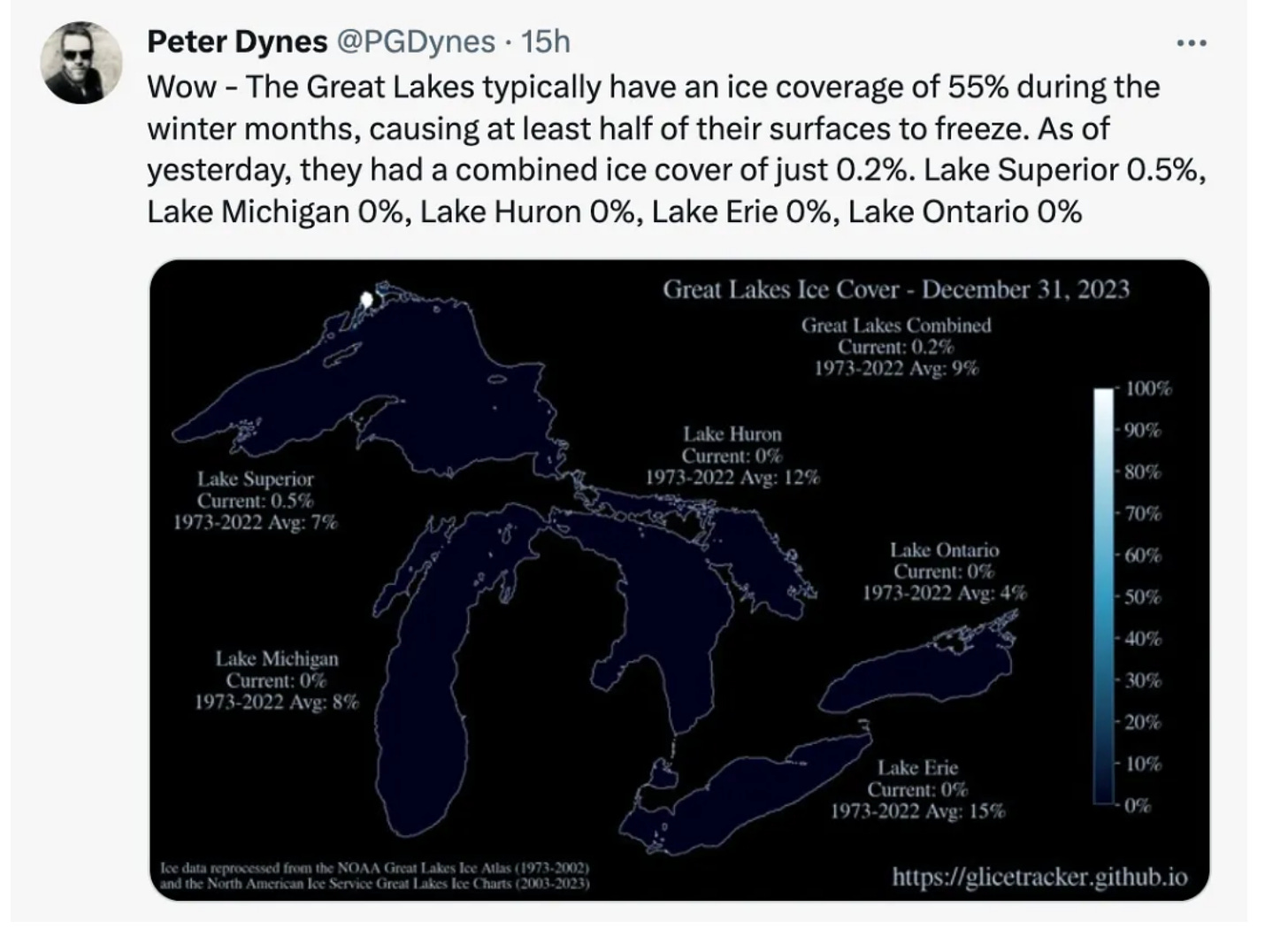BRIEFLY NOTED: For 2024-01-08 Mo
Another lost decade for Sub-Saharan Africa; China & Carolina shocks; David Brooks heists ideas & their expression from George Gilder; next to zero Great Lakes ice coverage,; VR & AR in 2024; very...
Another lost decade for Sub-Saharan Africa; China & Carolina shocks; David Brooks heists ideas & their expression from George Gilder; next to zero Great Lakes ice coverage,; VR & AR in 2024; very briefly noted; & why doesn’t Jane Austen’s Mr. Bennet have to flee for his life?; Bill Ackman’s 4000-word tweet; Samuel Sewall’s “The Selling of Joseph”; & BRIEFLY NOTED: For 2024-01-05 Fr…
SubStack NOTES:
Economics: It has been a very rough ride for Sub-Saharan Africa for a decade now, as far as economic growth is concerned. Yes, all the other components of Human Development Indices show substantial and extremely heartening progress. But when you take a look at the relative real GDP per capita picture since decolonization, you cannot help but be totally terrified:
Javier Blas: What Happened to Africa Rising? It’s Been Another Lost Decade: ‘The continent’s social and political malaise are symptoms… not the causes…. An utter dependence on commodities has proven harmful…. Borrowing costs…. The legacy of the recent Covid crisis persists…. A young and increasingly urban population that voraciously consumes social media, and you have an explosive cocktail…. Sub-Saharan Africa GDP per capita peaked in 2014 at $1,936 and has since fallen more than 10%… [while] global GDP per capita has risen nearly 15%…. Lifting GDP per capita can be a grueling fight against booming population growth. Over the last two decades, the size of the sub-Saharan population has doubled to 1.2 billion… expanding at a rate of, at least, 2.5% per year…. At risk isn’t merely the prosperity of a region that would be home to more than 3.5 billion people by 2100…. Without better living conditions… there’s no chance that democracy and freedom will be sustained or that nations will have the resources to adapt to climate change. The West better start paying attention now… <bloomberg.com/opinion/features/2023-09-…>
Economics: If you spent any time in Massachusetts cities like Lawrence, Lowell, Waltham, Fall River, and company—the old spindle cities—in the 1970s and 1980s you saw the effects of something very much like the China Shock, although it was the Carolina Shock, as the American textile industry up and moved south. Massachusetts’s regional development authorities could and should have moved faster to make the investments so that new industries could move in and take advantage of the buildings and the workers left behind, but they did move. So why wasn’t American state-level state capacity in the manufacturing belts of the Midwest and the Old South in the 2000s and 2010s a thing?:
Dan Drezner: The Post-Neoliberalism Moment: ‘The costs of the China shock had… to do with… authorities failing to respond…. Some American towns thrived with new investments, while others were "still reeling from a trade shock that ended a decade ago."… The… authors of the original China shock paper… [in] <cfr.org/blog/when-did-china-shock-end… they rejected the idea that admitting China into the WTO was a mistake…. "Quantitative models indicate that U.S. aggregate gains from trade with China are positive"… <reason.com/2024/01/07/the-post-neoliber…>
Journamalism: Yastreblyansky is annoyed by David F. Brooks writing about how capitalism is unequal-but-productive, puts us on a path to Walter Lippman’s Good Society, and so we should avoid zero-sum thinking and accept the inequities of today’s society. He is annoyed because:
it is not a smart argument, and
it looks as though Brooks stole it from George Gilder.
That is, it really looks as though Brooks wrote his column with George Gilder’s book open by his elbow—Lippman-Good Society-division of labor-zero sum—and did not mention Gilder at all. This does look to me to be a more serious act of intellectual theft than anything of which Claudine Gay or Neri Oxman is guilty.
David Brooks could have dropped a “As George Gilder noted…” reference. But I think it is highly likely that Brooks thought “my brand needs for me to pretend that I am smarter than I am, and Gilder won’t make any kind of fuss.”
It is very strange. Why not say: “I know I am smart, and one of the biggest ways I am smart is knowing that there are other people smarter than me on issue X, and so being willing to turn the mic over to them when it is appropriate”? Showing that you are confident enough in your smartness to choose who is worth giving credit to is real boss move. Pretending your sources and inspirations do not exist shows that you have judged yourself, and found yourself wanting:
Yastreblyansky: Of the Faking of Brooks: ‘David F. Brooks… [makes the] argument that we shouldn’t be complaining about the inequities of capitalism because capitalism is really a “positive-sum” game, as illustrated by the value-creating operations of increasing the division of labor…. Brooks start[s]… with the division of labor… move[s]… on to a… Walter Lippman quote, [and] end[s]… up with… the zero-sum model… fail[s]… to mention Gilder at all, constructs a pretense that he’s created it all himself, though he clearly got the whole thing from Gilder and doesn’t have anything to do with it himself. That’s plagiarism. He has stolen Gilder’s idea… <yastreblyansky.substack.com/p/of-the-fa…>
Let’s see if a little note appears, saying something like: “Brooks’s argument is borrowed from George Gilder'“…
ONE IMAGE: Great Lakes Ice Coverage?:
ONE VIDEO: CNE: VR and AR in 2024:
Very Briefly Noted:
Economics: Konstantinos Gravas: Economic history with an ideological compass: ‘DeLong… writes an original and ideologically penetrating "economic history" of the long—as he calls it—twentieth century… <https://www.kathimerini.gr/culture/562806529/i-oikonomiki-istoria-me-ideologiki-pyxida/>
Matt Yglesias: The Wire is a depiction of Wilson’s view of the crisis in urban America. That’s how I saw it when I watched the show, and as it turns out, that’s how Wilson saw it, too…. Part of what’s great about Wilson is that he has really good book titles, and they sum up quite nicely his two key ideas. One is “The Declining Significance of Race,” and the other is “The Truly Disadvantaged.” The point… [is while] race hasn’t lost its social salience… it’s not overwhelming in the way it once [was]…. A person who has gone to a selective college and entered a profession is going to have a meaningful amount in common with his classmates and colleagues of another race, alongside some meaningful differences…. It’s not that Cedric Daniels or Tony Gray have nothing in common with Marlo Stanfield or Avon Barksdale, but they really are coming from different worlds…. That population that is the truly disadvantaged—the kids you see in school in Season Four, but also the young people involved in gangs and drugs in the earlier seasons. Despite the end of Jim Crow and meaningful elements of both de jure and de facto segregation, a huge swathe of Baltimore society is totally cut off…. I’ve always thought Trump’s core base sort of resembles a white version of the people who loved Marion Barry here in DC… politicians who are good at speaking to people’s sense of marginalization, but not that good at running the government and actually fixing things…
Neofascism: Rick Perlstein: You Are Entering the Infernal Triangle: ‘What Bill Clinton said upon signing into law Temporary Assistance for Needy Families: “After I sign my name to this bill, welfare will no longer be a political issue.” Leaving office, he told a reporter, “I really believed that if we passed welfare reform we could diminish at least a lot of the overt racial stereotypes that I thought were paralyzing American politics.” This is the infernal triangle that structures American politics. In one corner, a party consistently ratcheting toward authoritarianism, refusing as a matter of bedrock principle—otherwise they are “Republicans in Name Only”—to compromise with adversaries they frame as ineluctably evil and seek literally to destroy. In the second corner, a party that says that, in a political culture where there is not enough compromise, the self-evident solution is to offer more compromise—because those guys’ extremist fever, surely, is soon to break… And in the third corner, those agenda-setting elite political journalists, who frame the Democrats as one of the “sides” in a tragic folie à deux destroying a nation otherwise united and at peace with itself because both sides stubbornly… refuse to compromise… <https://prospect.org/politics/2024-01-03-you-are-entering-the-infernal-triangle/>
Tom Aldrich: ‘The period of time during which small town and rural people built their expectations as to the kind of lives that they believed they were “entitled to” was remarkably short: the golden age of factory manufacturing, mostly automotive, in my small town didn’t really get rolling until after WWI and was already ending by the time I graduated from high school, let’s say 1925-1975…. At least in my personal experience, my peers who left town were never going to work in hourly-wage factory jobs to begin with. It was the gradual disappearance of plausible middle-management, small business and professional careers that pushed us out…. I and many of my high school peers never contemplated, even for a minute, making our careers in our hometown, and our parents never made much effort to convince us that staying was the right thing to do. In the higher reaches of my high school class, the people who stayed were mostly the scions of the local gentry…. I don’t think we had very concrete ideas of why we needed to leave town–more of a feeling–but, even in the midst of the golden age, that expectation had already somehow hardened into certainty. And this was fifty years ago!… <https://braddelong.substack.com/p/gentry-culture-and-the-left-behind/comment/46550815?r=d0v>
Tim Snyder: On Tyranny: ‘Twenty Lessons from the Twentieth Century…. 1. Do not obey in advance…. 2. Defend institutions. It is institutions that help us to preserve decency…. 3. Beware the one-party state…. 4. Take responsibility for the face of the world. The symbols of today enable the reality of tomorrow.… 5. Remember professional ethics…. 6. Be wary of paramilitaries…. 7. Be reflective if you must be armed…. 8. Stand out…. The moment you set an example, the spell of the status quo is broken.…9. Be kind to our language…. 10. Believe in truth. To abandon facts is to abandon freedom…. 11. Investigate. Figure things out for yourself…. 12. Make eye contact and small talk…. 13. Practice corporeal politics…. 14. Establish a private life…. Have personal exchanges in person…. Tyrants seek the hook on which to hang you. Try not to have hooks. 15. Contribute to good causes. … 16. Learn from peers in other countries…. 17. Listen for dangerous words…. Be alive to the fatal notions of "emergency" and "exception."… 18. Be calm when the unthinkable arrives…. 19. Be a patriot…. 20. Be as courageous as you can…
Cognition: Brink Lindsay: ‘Most customers consume the product moderately and responsibly, a minority abuse the product and mess up their lives, but that minority account for the bulk of total consumption and determine the profitability of the industry… makes for one of the nastier hazards of life amidst mass affluence…. With the stinginess of nature’s gifts replaced by endless artificial bounty, our instincts have been turned against us. We are forced to compensate for our misleading appetites with reflection and individual willpower—remedies that may suffice for most of us in the face of most of life’s temptations, but whose limitations are starkly revealed by our bulging waistlines and incessant phone checking…. Paternalistic policies such as taxes, zoning and time-of-purchase restrictions, or even outright bans, designed to discourage excessive consumption and abuse. But the same mass affluence that multiplies our temptations also leads us to value personal choice above all else…. [But] the idea that we’re respecting autonomy when we allow akrasia industries a free hand is kind of a joke: these industries exist to make a mockery of autonomy. It’s not autonomy, or sober and deliberate self-rule, that our culture prizes so highly, but rather the illusion that unchecked personal choice and autonomy are the same thing…. Bad productivity growth despoils our society with the deliberate infliction of human suffering—it’s hard to conclude that any society could be said to be flourishing, that its members are living “wisely and agreeably and well,” when the systematic exploitation of human weakness is being carried out to such an extent…. And meanwhile, on the other side of the ledger, you have comfortable majorities of satisfied, moderate customers—not to mention the huge pot of spending power created by the monetization of vice…
James Gleick: The Fate of Free Will: ‘In Free Agents, Kevin Mitchell makes a scientific case for the existence of human agency…. many authorities—physicists, neuroscientists, and even philosophers—… understand “free will” to be a feeling people have, but no more than that.… Mitchell is one of a new breed of biologists who espouse a complex-systems perspective as an antidote to reductionism. He aims to reclaim from the philosophers words like purpose, reason, and meaning, which scientists often avoid…. Somebody moved those fingers…. Sam Harris says that “I” don’t choose; choices are made “by events in my brain that I, as the conscious witness of my thoughts and actions, could not inspect or influence.” But where is the line that separates events in my brain from the conscious witness? Let’s say instead: We make choices. We make decisions. Some of our decision-making is prolonged and thoughtful, while some is spontaneous and practically random. We may understand our choices, we may rationalize them, or they may remain mysterious and obscure…. We are not just our consciousness; we’re the organism… <https://www.nybooks.com/articles/2024/01/18/the-fate-of-free-will-free-agents-kevin-mitchell/>
GPT-LLM-ML: Dave Guarino: Using AI to make sense of policy documents: ‘The ever-fun question of SNAP household composition. I've been experimenting with using AI to do "policy reasoning." That’s because fundamentally this is what staff have to do to answer questions about often complicated and complex rules…. Feeding in: a. SNAP federal regulations, paired with b. a real, verbatim SNAP client question… provide a prompt… a. Think step by step b. Ask follow-up questions if necessary…. GPT-4 then responds with some sense making as requested…. I then provide more information about the key dimensions…. And we get an answer. And, as a SNAP guy, I’ll say this answer is pretty good!…
Public Reason: Matt Karolan: Newsletter winter is coming: ‘Nobody likes their email inbox…. So What Should We Be Doing? We must divorce the message and the medium. Untethering the great content of newsletters from the crumby medium in which we’ve deployed them in. Doing this will be critical to making the newsletter format work…
Casey Newton: Why Substack is at a crossroads: ‘Some thoughts on platforms and Nazis…. Substack… wants to be seen as a pure infrastructure provider…. Recommendations might appear on their surface to be innocuous, and in most cases they are…. But turning a blind eye to recommended content almost always comes back to bite a platform. It was recommendations on Twitter, Facebook, and YouTube that helped turn Alex Jones from a fringe conspiracy theorist into a juggernaut that could terrorize families out of their homes… turned QAnon from loopy trolling on 4Chan into a violent national movement… helped to build the modern anti-vaccine movement. The moment a platform begins to recommend content is the moment it can no longer claim to be simple software…
















Why does David Brooks not cite George Gilder? Chestnuts, my precioussss, chestnuts. David Brooks is all about conservative respectability politics--a gig only found in the New York Times. George Gilder is, uh, not very respectable. Now if Edmund Burke had emitted a similar sentiment …
China's Rust Belt: I heard from a Chinese friend that there is a rust belt in northern China, created when heavy industry moved to the southeast of the country for cheaper labor, new plants, and new infrastructure - including ports for international trade. We tend to blame developing market trade for rust belts, but are rust belts an unfortunate tendency of industries relocating, even within the country?